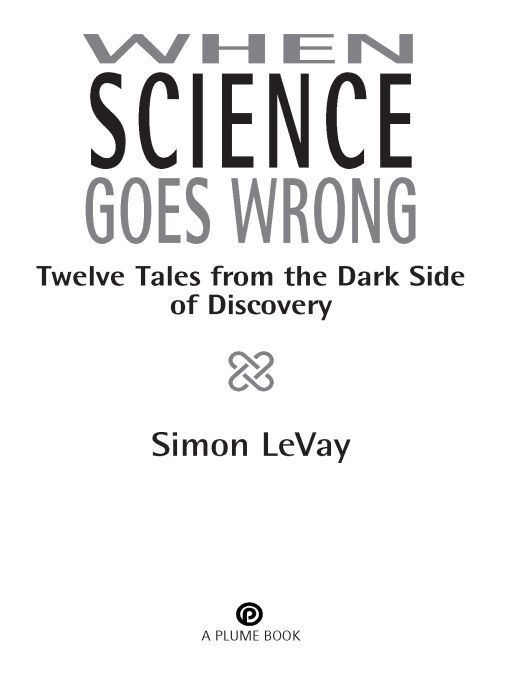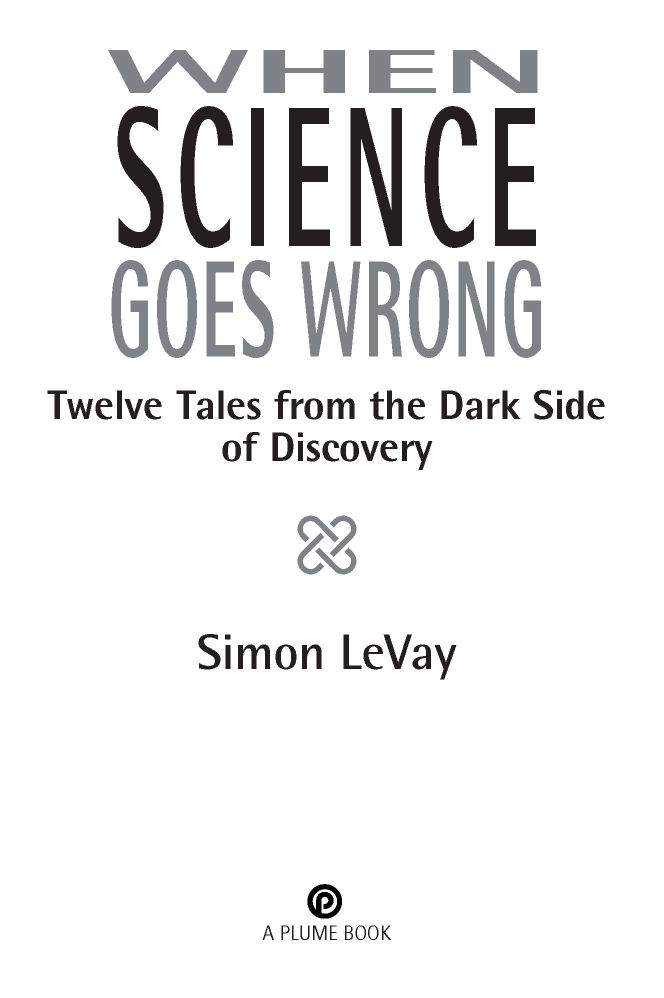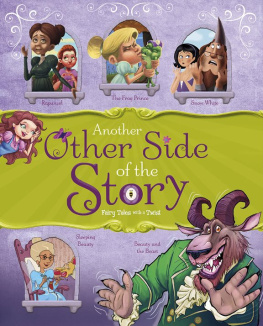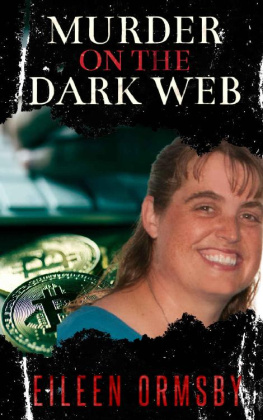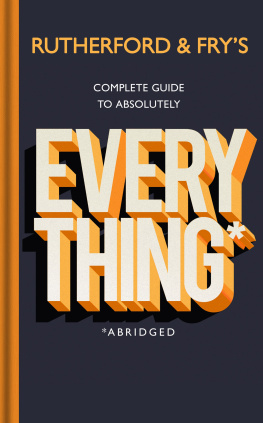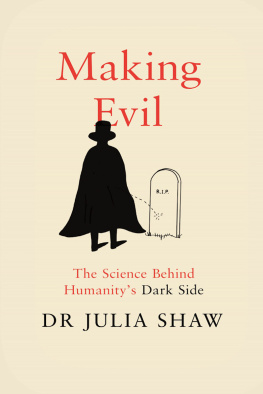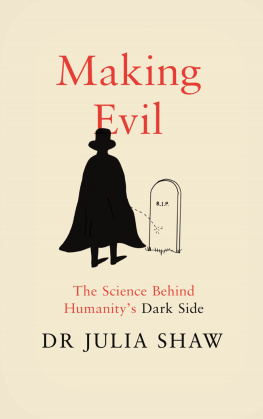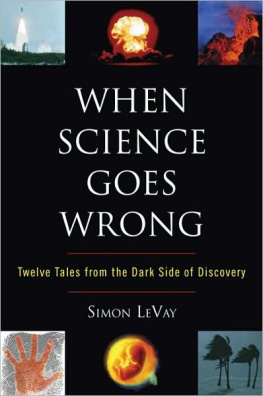Table of Contents
A PLUME BOOK
WHEN SCIENCE GOES WRONG
SIMON LEVAY is a British-born neuroscientist who has served on the faculties of Harvard Medical School (1971-1984) and the Salk Institute (1984-1992). He is best known for a 1991 study published in Science that reported on a difference in brain structure between homosexual and heterosexual men. Since 1992 he has been a writer based in West Hollywood, California. He has written or coauthored eight previous books, including The Sexual Brain, Queer Science, and the college textbook Human Sexuality (with Sharon Valente). He was the 1963 bicycle hill-climb champion of East Anglia, a perfectly flat region of England.
ALSO BY SIMON LEVAY
The Sexual Brain. MIT Press, 1993.
City of Friends: A Portrait of the Gay and Lesbian Community in
America (with Elisabeth Nonas). MIT Press, 1995.
Queer Science: The Use and Abuse of Research into Homosexuality.
MIT Press, 1996.
Albricks Gold. Richard Kasak Books, 1997.
The Earth in Turmoil: Earthquakes and Volcanoes and their Impact
on Humankind (with Kerry Sieh). W. H. Freeman, 1998.
Here Be Dragons: The Scientific Quest for Extraterrestrial Life
(with David Koerner). Oxford University Press, 2000.
Healing the Brain: A Doctors Controversial Quest for a Cure for
Parkinsons Disease (with Curt Freed). Times Books, 2002.
Human Sexuality (with Sharon Valente). Sinauer Associates (2002,
2nd edition 2006).
Preface
Mostly, we hear about sciences triumphsthe wonder drugs, the moon landings, the ever-faster computers. But for every brilliant scientific success there are a dozen failures. Usually these involve no more than some wasted dollars and a blank spot on someones rsum. Once in a while, though, science doesnt just failit goes spectacularly, even horribly, wrong. And that makes for a great story.
This book is a collection of twelve such stories. They are linked by the common thread of scientific failure, but in other respects they are quite diverse. I wanted, in the first place, to range over many different kinds of science. Some of the chapters relate to explorations within the basic sciences, such as nuclear chemistry, volcanology, and neuroscience. The majority, however, focus on the applied sciences, because it is when science serves human ends that the opportunities for truly memorable screw-ups are most likely to arise. These sciences include medical research, forensic science, meteorology, microbiology, and psychology. One of the stories deals with an engineering failure, but it was a failure rooted in scientific error.
In addition, I wanted to illustrate the rich variety of ways in which the scientific process can go awry. Failures, disasters, and other negative outcomes of science can result not only from bad luck, but also from the failure to follow appropriate procedures or to heed warnings, from confusion of units, from ethical breaches in the treatment of human subjects, from the pressure to get quick results, from excessive ambition or financial greed, from the failure to think broadly enough about the consequences of ones work, or from fraud. Or even from a couple of mislabeled bottles. The stories in this book illustrate the consequences of many of these factors, acting alone or in diabolical combination.
This book is not an attack on science. I am a scientist myself, and I consider science to be one of the most beautiful, challenging, and worthwhile activities that humans can engage in. The events described in this book are no more the story of science than plane crashes are the story of aviation. If I thought that the publication of this book would bring the entire cavalcade of science to a jangling haltor even impede its progress in the slightest degreeI would not have written it.
The book is also not intended to be a complete or academic survey of scientific failure. There are plenty of sciences that escape mention in these pages, plenty of failure modes that I dont discuss, and plenty of errors more laughable, accidents more tragic, and wrongdoings more egregious. Rather than trying to be comprehensive, I have followed the advice offered to the historian by Lytton Strachey in Eminent Victorians: He will row out over that great ocean of material, and lower down into it, here and there, a little bucket, which will bring up to the light of day some characteristic specimen, from those far depths, to be examined with a careful curiosity.
In keeping with this approach, I have not arranged my specimens into any logical order, based for example on their historical sequence, the scientific disciplines they relate to, or the modes of scientific failure that they exemplify. Instead, I have laid them out on the deck in what I hope is an agreeable pattern, juxtaposing light and dark, new and old, innocent and malevolent. If they coalesce into a larger picture, so much the better.
It is customary in a book of this kind to thank ones sources, but I do so with particular sincerity in this case, because some of the people I interviewed were agreeing to talk about episodes in their lives that they would probably rather forget. They had little to gain from reliving those episodes, and I thank them for doing so.
This book is not just about scientific error and wrongdoing, however; it is also about bravery in the face of danger, endurance in the face of suffering and loss, intelligence and persistence in the search for causes, and even sometimes about the right way of doing science. Some of my interviewees exemplify those traits, and I thank them sincerely too.
The complete list of the people I interviewed is as follows: Ken Alibek, Ph.D., Nicoline Ambrose, Ph.D., Colin Blakemore, Ph.D., Oliver Bloodstein, Ph.D., Arthur Caplan, Ph.D., John Casani, Ph.D., Bernard Chouet, Ph.D., Rick Doblin, Ph.D., Raymon Durso, M.D., Robert Erickson, M.D., Michael Fish, Rebecca Folkerth, M.D., Curt Freed, M.D., Paul Gelsinger, Bill Giles, Jack Green, Ph.D., Kenneth Gregorich, Ph.D., Charles Grob, M.D., Jeanne Guillemin, Ph.D., Peter Gumbel, Stephen Hanauer, Ph.D., Anita Hart, Robert Iacono, M.D., Steve Jolly, Ph.D., Thomas Jung, Ph.D., Walter Loveland, Ph.D., Ewen McCallum, M.Sc., Matthew Meselson, Ph.D., Victor Ninov, Ph.D., George Ricaurte, M.D., Ph.D., Richard Schwartz, Ph.D., William Thompson, J.D., Ph.D., Sam Thurman, Ph.D., Don L. Truex, D.D.S., Kay Truex De Justo, Inder Verma, Ph.D., and Charles Wood, Ph.D.
There were also people who played key roles in the events described in this book but who declined to speak with me, or who did not respond to repeated requests for an interview. I have attempted to describe their actions and represent their viewpoints as accurately and fairly as possible by reference to their published writings or statements, news reports, or information provided by other interviewees. Any failure to do them justice represents a shortcoming in this book that I regret.
I am grateful to Christian Wehrhahn, Ulrike Seibt, Kerry Sieh, and my brother, Benedict le Vay (author of the Eccentric Britain series), for reading and commenting on portions of the book. Ben also helped develop the books concept, and my agent Andrew Lownie helped turn that concept into a proposal for a saleable manuscript. So all I had to do was write it.

